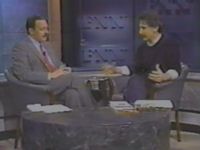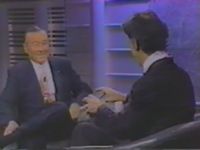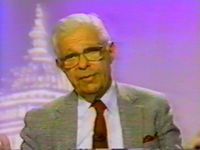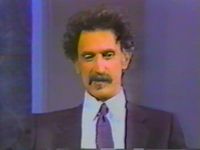
February 26-28, 1990
FNN
FZ is guest host, replacing Bob Berkowicz.
I was invited to be a guest on Bob Berkowitz' show to talk about business opportunities in the Soviet Union, which I knew something about from my travels there. It was a fairly amusing half hour. After that, Bob asked me to guest-host his show while he was on vacation.
HUMO: You were once a financial correspondent in the Soviet Union for the American TV-station FNN (Financial News Network). Zappa as financial advisor??
FZ: For them it was good to have a well known, controversial figure as an anchor man, and I finally got a forum and a bit of power. Not that I'm such a power hungry person but it's rare for someone like me to get a free tribune, because that's what "Frank Zappa's Wild Wild East" was.
February 26, 1990
FNN
24 min.

FZ interviews Vladimir Zvyagin, bureau chief of Soviet television in the United States, in the studio, with audience phone calls. Also includes Honker Home Video reports and interviews with Vladimir Alyoshin, manager of the Luzhniky Sports Center; Michael Beglow, chief of the Audio/Visual Department of TASS; Mikhail Afanasiew, director of the Commercial Department of IMEMO; and Michael Vishnikov, owner of the Ginseng Beauty Center.
YouTube: Frank Zappa—FNN—Part 1 (10:53 min.) · Part 2 (10:59 min.)
February 27, 1990
FNN
23 min.

FZ interviews Sirio Maccioni, restauranteur & owner of Le Cirque, NYC, in the studio, with audience phone calls.
YouTube: Frank Zappa—FNN—Part 3 (10:57 min.) · Part 4 (10:59 min.)
February 28, 1990
FNN
21 min.


FZ interviews Daniel Schorr, from Washington, D.C.
I went and did this special on the Soviet Union, did interviews and so forth and came back to put the show on air. But the people who ran FNN were so terrified they put a disclaimer on before the programme saying that, 'Mr. Zappa's opinions are his own and Blah Blah Blah'. I don't know what the fuck they thought I was going to say once I got on there. It was very strange. I had this interview with a guy from a financial research institute in Moscow who was talking about how many military factories there were that they were willing to convert to the manufacture of consumer goods. And this was like three years ago. I had coverage of the first Russian beauty parlour. An interview with a guy from the Australian Embassy who was telling me about the Australians working in conjunction with the Russians to go into the Aerospace business together... I came back with some real hot news and they decided that they didn't want to run it.
There's this big sports complex right in the middle of Moscow. It's where the Lenin Stadium is, they have all these facilities there and they were looking for some Western partners to come in. I managed to persuade a couple of people to go to Moscow and talk to this guy, Vladimir, who turned out not to be a very good businessman at all. When he saw that he actually had Western businessmen sitting in his office taking notes he decided to triple the price of everything he had quoted to me. They just walked out saying, 'This guy's crazy'. I've looked foolish before, I'm sure I'll look foolish again. And I'm not doing anything with Why Not? now. It's very difficult for me to travel at the moment and you can't do that kind of business sitting at home. I just had to let it go.
It was the Financial News Network (FNN), which turned into... errr, is it CNNfn? But he appeared quite often, and was sent on at least one assignment. To Moscow, I think..
Yep, here it is:
The Nation. March 19, 1990
FRANK ZAPPA IN PRAGUE
—THE ROCK EMISSARYFrank Zappa- Trading Partner
Such is the dizzying pace of events in Eastern Europe, you may have missed the new that Frank Zappa, avant-garde rock musician and composer, a now working with the Czechoslovak government as an emissary for culture. Zappa, who has been involved in U.S.-Soviet joint ventures, traveled to Moscow in January for the Financial News Network to help put together a television program on which Soviet and American entrepreneurs would discuss potential business opportunities. While in the Soviet Union, he decided to go to Prague to shoot some short new reports for FNN. Soon after returning from Czechoslovakia, Zappa talked with Washington editor David Corn. -The Editors
How did you make your first contact with President Vaclav Havel?
I called Michael Kocab, who is both a famous Czechoslovak rock-and-roll musician and- now here's progress—a member of Parliament. We had met in Los Angeles last year, and now all of a sudden he's in the middle of a democratic revolution. "Could I possibly have an interview with Havel?" I asked. No problem, he said.
Thousands of fans greeted me when I arrived in Prague with my video crew. For twenty years, my albums have been smuggled into the country. After spending a day or so just looking about at life in Czechoslovakia, I went to Hradcany Castle to meet President Havel. The President told me he especially likes my early records with the Mothers of Invention and the Bongo Fury album I made with Captain Beefheart. He asked me to play at a concert honoring him during his state visit to the United States. He was hoping that the Rolling Stones and Joan Baez would also perform. [But the final result would be quite different. Instead, Paul Simon, James Taylor and Dizzy Gillespie played at the New York concert for Havel.]
But you were there to discuss business as well.
Right. I started to talk to him on behalf of FNN. "What sort of foreign investment is Czechoslovakia looking for? Why should foreign investors put their money into Czechoslovakia?" These questions, Havel said, should be addressed to his financial ministers. Then at a small lunch with Havel, his wife, Olga, Richard Wagner, Vice Minister and adviser for economy and ecology, and Valtr Komarek, a deputy prime minister and leader of their new economic team, we discussed how the country could increase its income, and the conversation continued later that day at dinner in a villa near the castle. At my request, Milan Lukes, the Czech Minister of Culture, was present. Havel and his ministers know they need some Western investment, but they don't want all the ugliness that often invades a country with Western investment. The easiest way to keep the lid on that is to have someone involved whose primary concern is culture, who can reject or modify a project if it is going to have a negative impact on society. Hence my request for the involvement of the Minister of Culture.
After dinner, Lukes went on television and announced that I would be representing Czechoslovakia on trade, tourism and cultural matters. The next morning I received a letter from Komarek, which began, "Dear Sir, may I entrust you [with] leading negotiations with foreign partners for preparation of preliminary projects, possibly drafts of trade agreements?"
So what's the plan for Czechoslovakia?
What they don't want can be summed up by the comment urgently made by one of the many kids who trailed me throughout my visit: "Frankie, Frankie, please don't bring me Las Vegas." There is a direction in which they want to head. Look at Austria, which does $10 billion a year in tourism. Austria has managed to convert its culture -its concert halls, museums and architecture—into a consumable commodity and at the same time preserve its heritage. Czechoslovakia, with its musical, theatrical and artistic legacy, has the potential for the same. All I knew about Czechoslovakia before I got there was what I had seen on Cable News Network: people walking around in dingy, gray streets and having a revolution. I had no idea how pretty and quiet it is. Prague is clean and comfortable, and the food is good. The airport is not a hellhole like Sheremetyevo in Moscow. This is a very pleasant country, and it's in good shape. They need to create a tourism infrastructure that makes it more accessible to the West.
According to Vice President Vladimir Dlouhy, the total amount of hard-currency trade between Czechoslovakia and all Western countries is $4 billion annually. If they can increase it by only $1 billion, that would represent a 25 percent boost in the overall standard of living. I doubt whether any other Eastern European nation could do so well in the short term.
But what about hard industry? General Motors is setting up a factory in Hungary. Will we see the same in Czechoslovakia?
Havel and his advisers do want industry, but they do not want to import businesses that will exacerbate the ecological problems left behind by the Communists.
Since Czechoslovakia still burns a lot of coal, I suggested that the government explore magnetohydrodynamics [M.H.D.]. This is a process in which low-grade coal is burned but the emissions are cleaned, put through a loop and used to increase the electricity output-like a turbocharge. How do I know about this? In 1986 I sat on a plane next to a lobbyist from TRW, which developed M.H.D. My associate Jim Nagle is now collecting information on M.H.D. to forward to Prague.
Just about every telephone company on the planet has been to Prague offering to fix the country's inefficient telephone system. And, no surprise, the price tag is enormous. Last year, for instance, A.T.&T. announced a deal with the Italian government to rewire the phones there at a cost of $30 billion. Not one of these companies had suggested to the Czechoslovak government, as I did, that it go cellular. Skip the rewiring and hand out cellular phones to everyone. This will make unnecessary the stringing of wires through ancient buildings with nine centuries of history. Better ways of burning coal, a new phone system, tourism—this was our dinner conversation. This is a brand-new government made up of artists, writers and musicians. They know they are making over society. That's their mission. But they realize they will ultimately be judged on whether they- an artistic, humane group-can run an economy.
So, have Western firms and entrepreneurs eager to do business in Czechoslovakia found you yet?
Are you kidding? Before I returned to Los Angeles, the calls and letters were already coming in. A division of McDonnell Douglas wanted to talk. An Australian company that has developed something called the Jac tractor-a four-wheel drive, all-terrain minitractor capable of doing all sorts of clearing work that runs on a gallon of gas a day and is perfect for Third World farmers-wanted to talk. I heard from someone who wanted to open a pet-food factory in Czechoslovakia. We're having lunch.
And what makes Frank Zappa the right person to advice a nation on its trade and economic development?
Do I need to be an expert in international finance to do this job, to help writers, musicians and intellectuals achieve their vision? I'm the guy who sat next to a guy on a plane who knew about M.H.D. You collect all this information; you make the connections that need to be made. Now we have a chance to make a lot of new connections. It's just like making a piece of music. You start with the theme. Then, what's the melody? How do you develop the harmony? What's the rhythm below it? You don't have to know about international financing. You just have to know about composition.
In a new memoir, Sirio Maccioni, owner of New York's snooty Le Cirque restaurant, gleefully dishes the names of luminaries he has fed over the decades: Frank Sinatra, Nancy Reagan, Henry Kissinger, Richard Nixon, Donald Trump, Woody Allen, Barbara Walters, Bill Blass and Jacqueline Kennedy Onassis, to list a few. But none of them, he says, became "my best friend." That honor belonged to a long-haired, "rough-looking" musician initially barred from the restaurant as woefully underdressed: Frank Zappa.
"It was a very difficult beginning of the relationship," Maccioni, 72, told us during a stop in Washington last week. He still tears up when talking about Zappa, the Baltimore native who died of prostate cancer in 1993 at age 52: "He was a great man and a very intelligent man. . . . I wish he was alive today."
The book, "Sirio," recounts how Zappa, in the early '80s, had to don a suit and tie before he could claim a table among the swells at Le Cirque. "This better be the best [expletive] meal of my life—I've toured the Kremlin, met the pope, and I've never needed a suit," the restaurateur quotes him as saying. "If I don't like this meal, you're paying for the suit!"
But somehow the two Italians bonded like long-lost paesanos. "He came to eat at my house. He became friends with my wife. I spoke with him two days before he died," Maccioni told us. To comfort Zappa, "I sent my pastry chef to make creme brulee for him in Los Angeles."
And, as a true friend, Maccioni was always honest: "I had the courage to tell him I did not understand his music."
Additional informant (YouTube alert): Omair Eshkenazi
Maintained by Román García Albertos